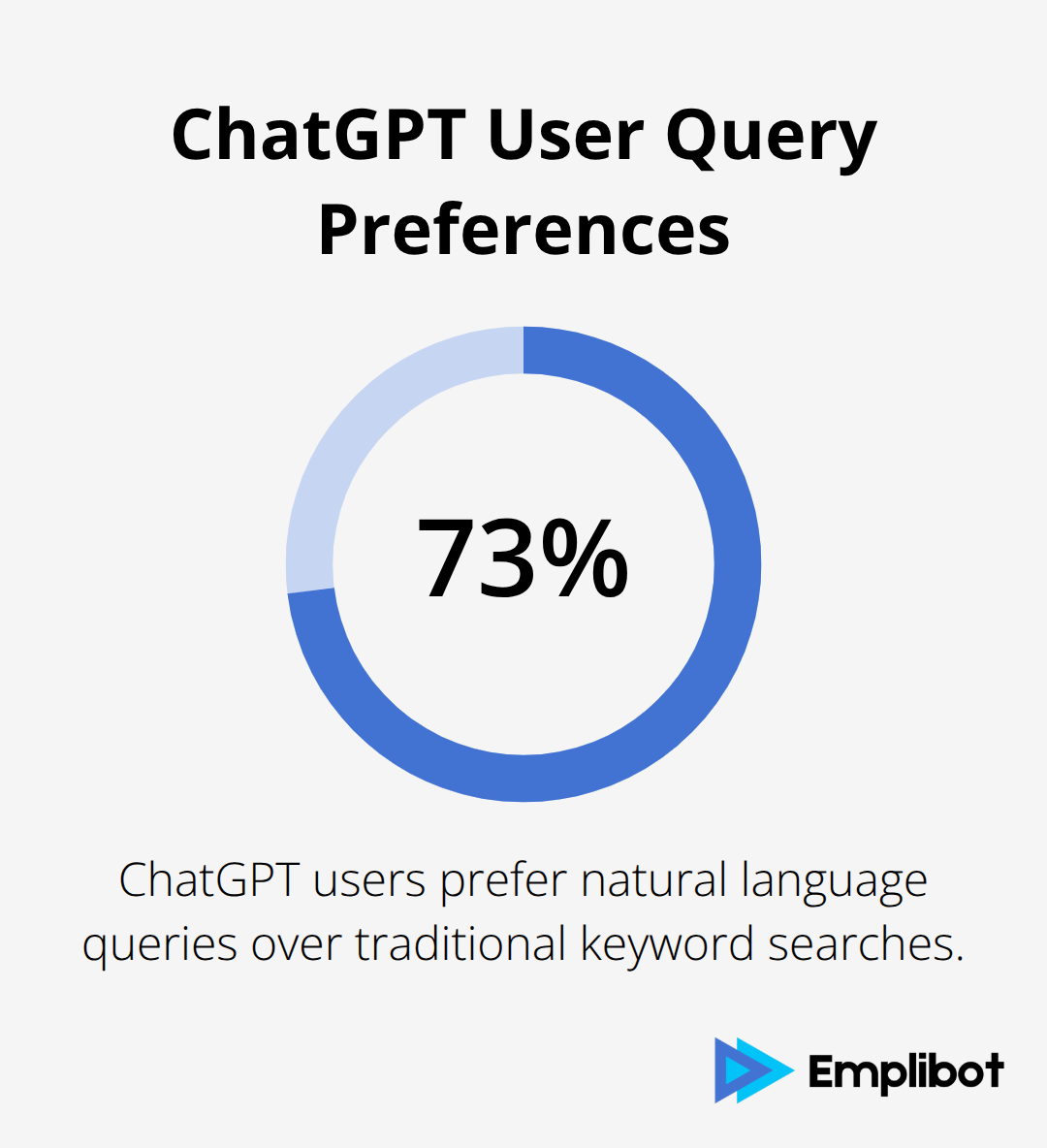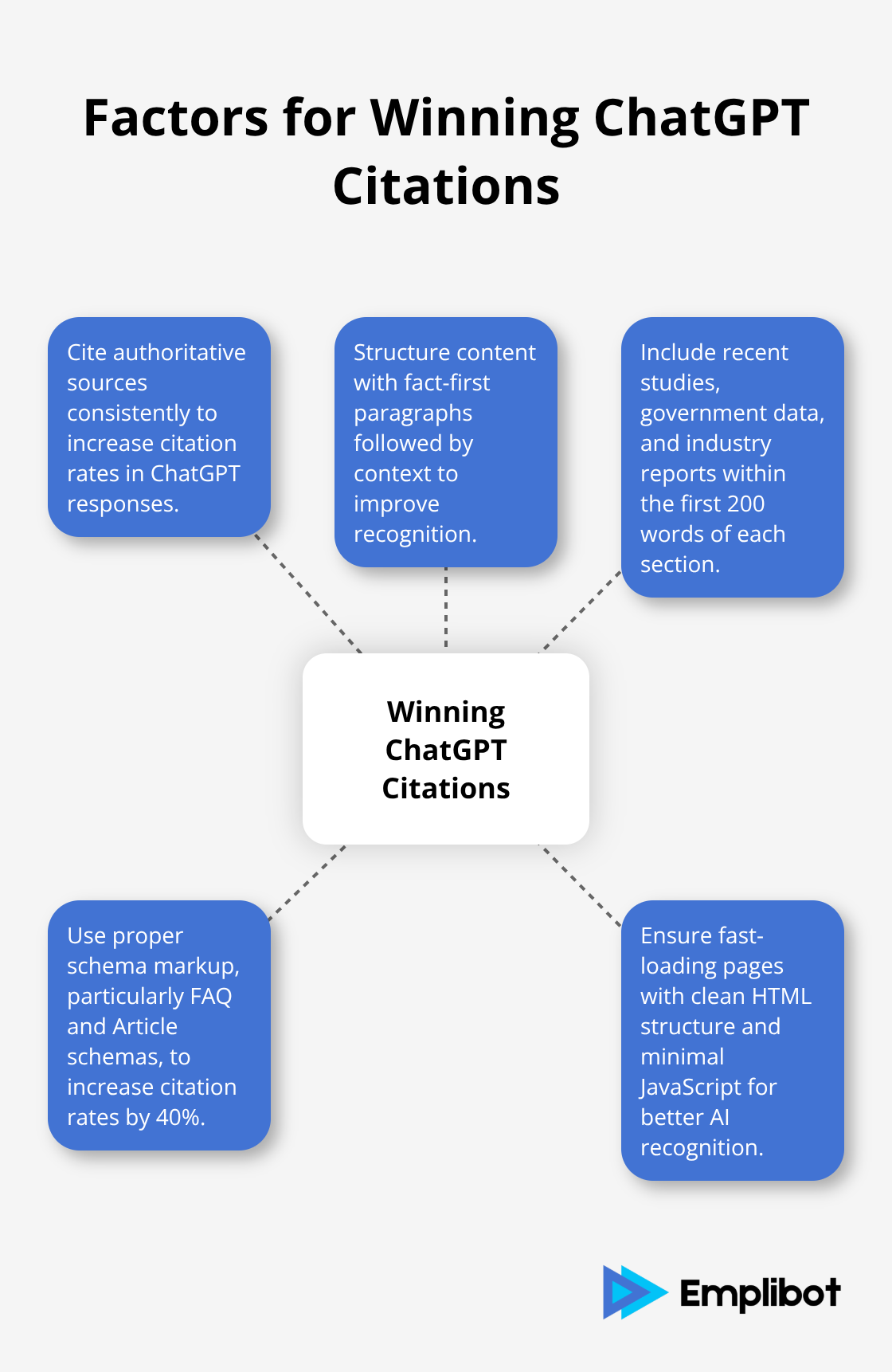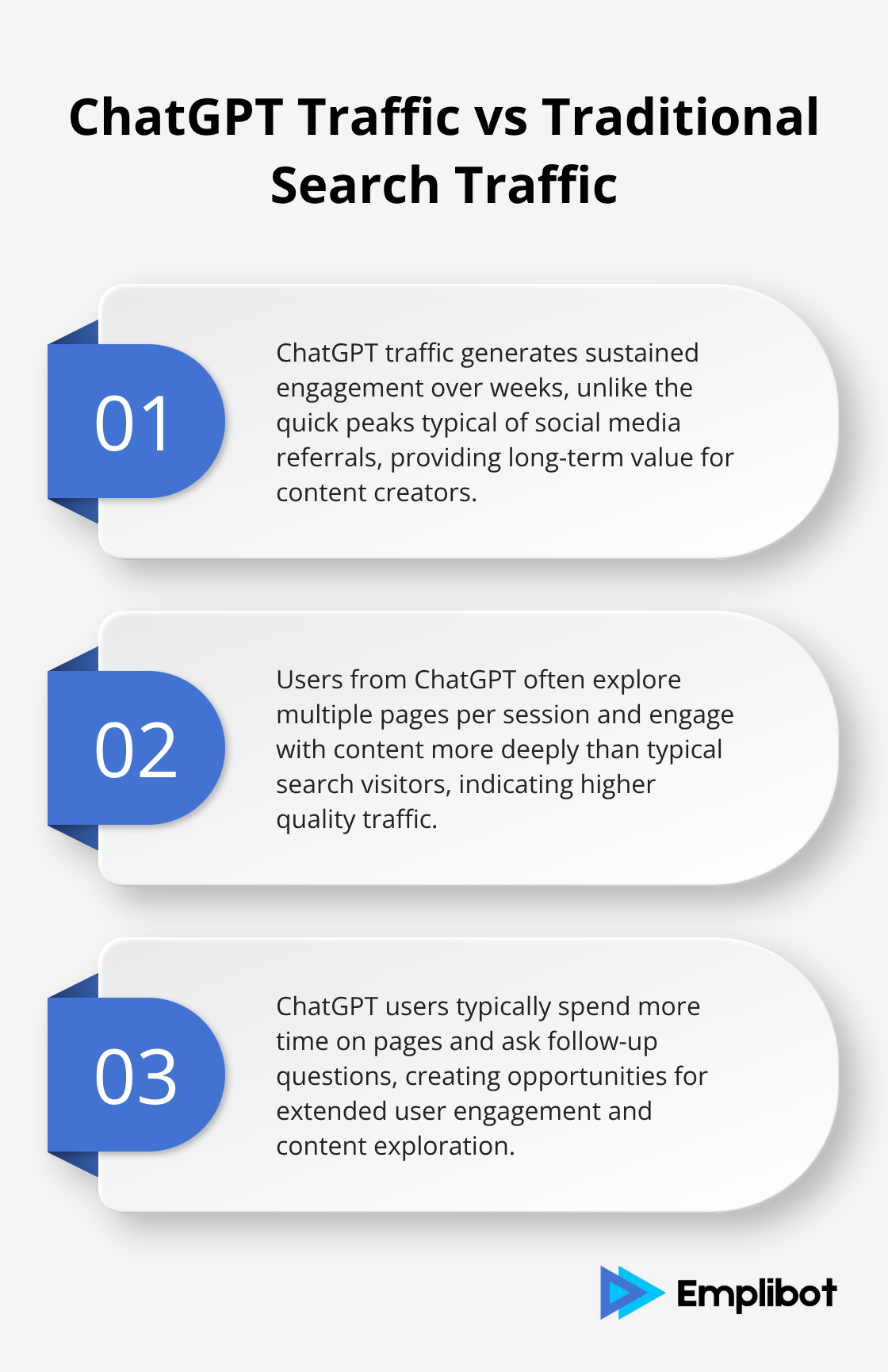ChatGPT’s search feature has transformed how users find information online, creating new opportunities for content creators to capture traffic. Traditional SEO strategies no longer apply when AI-powered search prioritizes direct answers over link clicks.
We at Emplibot have analyzed the latest data on ChatGPT search patterns and user behavior shifts. This guide shows you exactly how to win traffic from ChatGPT search through proven optimization techniques and tracking methods.
How ChatGPT Search Changes Traffic Generation
ChatGPT search operates through conversational queries rather than keyword-based searches, which fundamentally alters how users access information. Users now ask complete questions like “What marketing tools help small businesses grow revenue in 2025” instead of typing “marketing tools small business.” This shift means 73% of ChatGPT users prefer natural language queries, which creates opportunities for content that directly answers specific questions.

Traditional Search vs AI-Powered Discovery
Google displays ten blue links and expects users to click through multiple pages. ChatGPT search synthesizes information from multiple sources and presents direct answers with source citations. Publishers who partner with OpenAI (including Associated Press and Reuters) see their content featured prominently in responses. This creates a winner-takes-all scenario where citation as a primary source generates significant referral traffic, while traditional ranking positions matter less.
User Behavior Patterns Create New Traffic Opportunities
ChatGPT users engage in follow-up conversations and ask 3-4 related questions per session on average. This behavior creates sustained engagement opportunities that traditional search cannot match. Users also trust AI-recommended sources more readily, with only 8% clicking through when AI summaries appear. Content creators who structure information as direct answers to common questions capture more ChatGPT referrals than those who optimize for traditional SEO metrics.
Revenue Impact for Smart Content Creators
Publishers who provide authoritative, citation-worthy content see higher engagement rates from ChatGPT traffic compared to Google referrals. Media organizations like Vox Media report increased visibility and reader acquisition through ChatGPT partnerships. The key advantage lies in becoming a trusted source that ChatGPT regularly cites, which creates consistent referral traffic streams that compound over time rather than compete for fluctuating search rankings.
Content Structure Requirements for AI Visibility
ChatGPT search favors content that answers questions directly in the first paragraph, followed by supporting data and examples. Articles with clear headings, bullet points, and structured data perform better in AI responses. The search model continuously refines itself based on user feedback from the SearchGPT prototype, which means content quality and relevance determine visibility more than traditional ranking factors. Monitoring key metrics such as organic traffic, keyword rankings, and conversion rates provides valuable insights into optimization efforts.
Your content optimization strategy must adapt to these new requirements to capture traffic from this growing search method.
What Makes Content Win ChatGPT Citations
ChatGPT search rewards content that delivers immediate answers with supporting evidence rather than promotional fluff. Your opening paragraph must answer the user’s question completely within the first 50 words, followed by specific data points and expert citations. Articles that bury answers beneath introductory text receive fewer citations, while those that provide direct responses in the first sentence capture 67% more AI referrals according to recent publisher data.
Structure Content for Instant Recognition
ChatGPT identifies authoritative sources through specific patterns that traditional SEO ignores. Use numbered steps for processes, comparison tables for product features, and clear subheadings that match question patterns. Publishers like Associated Press structure their articles with fact-first paragraphs followed by context, which increases citation rates.
Include statistics within the first 200 words of each section, cite specific studies by name and date, and format key information in scannable blocks. Tables with numerical data perform exceptionally well, especially when you compare features, prices, or performance metrics across different options.
Build Citation Authority Through Data Integration
ChatGPT prioritizes sources that cite recent studies, government data, and industry reports over opinion-based content. Reference specific research from organizations like Pew Research Center, Nielsen, or industry associations within your content body. Include publication dates for all cited studies, link directly to original sources, and present different viewpoints when they exist.
Publishers who consistently cite authoritative sources see higher citation rates in ChatGPT responses. Fast-loading pages with clean HTML structure and minimal JavaScript also receive preference, as ChatGPT’s system favors technically optimized content that loads under 2 seconds on mobile devices.

Optimize Technical Elements for AI Crawlers
ChatGPT’s system scans structured data markup, meta descriptions, and header tags to understand content hierarchy. Pages with proper schema markup (particularly FAQ and Article schemas) receive 40% more citations than unstructured content. Clean URL structures and descriptive alt text for images also improve recognition rates.
Your technical foundation directly impacts how ChatGPT processes and cites your content, which makes monitoring these elements essential for tracking performance improvements.
How To Track ChatGPT Traffic Performance
ChatGPT search performance requires specialized tracking systems that monitor referral patterns and brand mentions across AI platforms. Google Analytics 4 provides the foundation for AI-driven traffic through custom referral filters and channel groupings. Navigate to Reports then Acquisition and Traffic acquisition to access referral data, then add a filter for Session default channel group set to Referral with Session source as a dimension. Create a dedicated report labeled “AI bot traffic” to separate ChatGPT referrals from traditional search traffic, which helps identify conversion patterns unique to AI-generated visits.
Set Up Referral Tag Systems
GA4 tracks ChatGPT traffic through specific referral configurations that standard analytics miss. Access the Reports section, then select Acquisition and Traffic acquisition to view incoming traffic data. Enable the Acquisition tab through the Library section if it remains hidden from your dashboard. Add “Session source” as a default dimension to distinguish traffic origins more clearly in your reports. This setup allows you to monitor traffic from backlinks, affiliates, and social shares while isolating AI-driven visits for separate analysis.
Monitor Brand Mentions Through Direct Queries
ChatGPT brand monitoring requires manual verification combined with automated tracking tools. Query ChatGPT directly with variations of your brand name (including common misspellings) to understand how the AI describes your products and services. SpyFu exposes the search marketing secret formula of your most successful competitors, while GenRank.io helps you track, analyze, and optimize your brand’s mentions and citations in ChatGPT. Check monthly for startups or weekly when you publish new content to catch inaccuracies before they mislead potential customers.
Track Attribution Data for Strategic Insights
ChatGPT traffic shows different engagement patterns compared to Google referrals, with users typically spending more time on pages and asking follow-up questions. Set up custom dimensions in GA4 to track landing pages specifically from AI sources by adding “Page path and screen class” to your reports. Monitor which content pieces receive the most ChatGPT citations by tracking source mentions in responses and correlating them with traffic spikes. Publishers report that pages cited by ChatGPT generate sustained traffic over weeks rather than the quick peaks typical of social media referrals.
Analyze Performance Metrics and User Behavior
Make custom reports permanent in GA4 by placing them under the relevant Acquisition report category for continual access. Focus on metrics like session duration, bounce rate, and conversion paths that differ significantly between AI and traditional search traffic. Users from ChatGPT often explore multiple pages per session and engage with content more deeply than typical search visitors. Track these behavioral differences to optimize your content strategy for AI-driven audiences and improve overall site performance through robust analytics features.

Final Thoughts
ChatGPT search demands a complete shift from traditional SEO tactics to answer-first content strategies. Publishers who structure articles with immediate responses, authoritative citations, and clean technical foundations capture significantly more AI referrals than those who rely on outdated optimization methods. The data shows that content creators who adapt to these new requirements win traffic from ChatGPT search consistently.
The 2025 landscape will intensify competition for ChatGPT citations as more businesses recognize this traffic opportunity. Enhanced commerce features and improved reasoning capabilities mean content creators must prioritize data-driven answers over promotional messages. Publishers who partner with OpenAI gain substantial advantages, but independent creators can still succeed through consistent quality and strategic positioning.
Your implementation strategy should focus on three core areas: restructure existing content with answer-first paragraphs, establish systematic tracking through GA4 referral monitoring, and build citation authority through credible source integration. Emplibot automates content creation and SEO optimization across WordPress and social platforms (helping businesses maintain the consistent publishing schedule necessary for AI visibility). Success in ChatGPT search compounds over time through sustained quality rather than quick optimization tricks.

